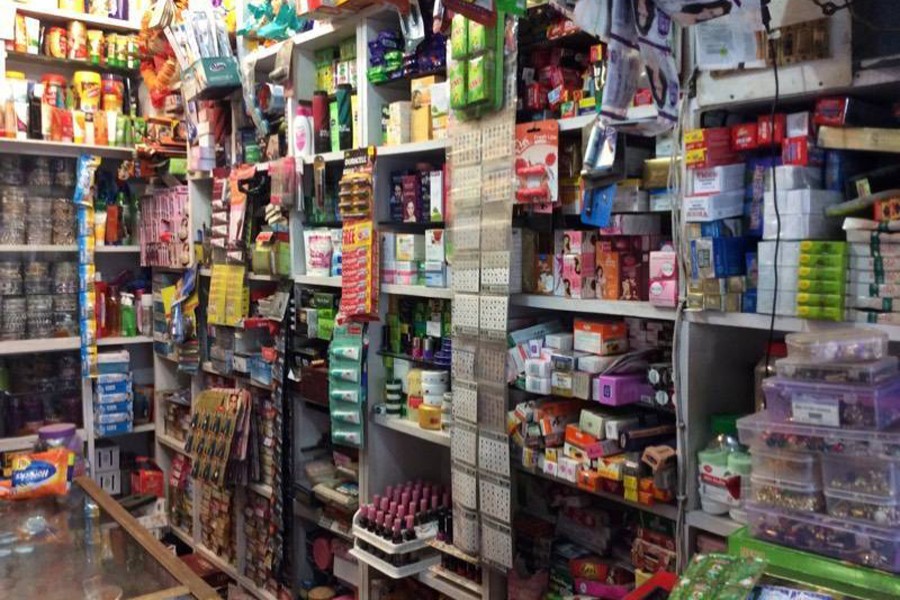I may not have been good at leading a methodical life. But I can say I am successful in the equation of family expenditures! It's because I am a man of limited means. I have to lead my daily life to avoid the dangers that may lie ahead for a man with paltry financial income. There may be another reason of my success - I am a student of Accounting and Economics!
I do the family shopping myself. I go to more than one market to purchase the necessities at just price. The experience of my purchase of the daily necessities in the last two years is negative. I have observed that the prices of same goods manufactured in the country are priced differently in the same market - whatever is written as MRP (Maximum Retail Price) or more! It is illegal for any seller to take more than the amount mentioned on the packet from the consumer. Rather prices less than the MRP can be taken, said a producer known to me. But most of the shopkeepers have thrown it to the winds. About two years ago I purchased cosmetics of a well-known toiletries producer at a price less by Tk 5 than the Tk 35 MRP mentioned. I also observed the same with shampoos, Vaseline and cream gel.
Now, it is just the opposite -- prices differ from one shop to the next or from one shopping mall to the next. When the price difference is pointed out, the shopkeeper would say "He is a thief" or "His goods had been purchased earlier."
To earn too high profits is a longstanding desire of our businessmen -- from the wholesaler to the neighbourhood shop. The recent abnormal profit mongering of an organised gang of rice sellers is a glaring example.
There is a competition in the sale of daily necessities due to the participation of producers, be they from the country or abroad. Because of the maximum profit policy, foreign producers of daily necessities have captured the market. Our manufacturers do not believe in the policy of offering standard goods at less profit, whereas the foreign manufacturers believe in selling maximum goods at reasonable profit. That is why we have observed a multinational company's performance with reputation in our market since 1890. Despite having the strength, many well-known companies have failed to attain that level.
The policy of an enlightened producer or businessman is "make profit but don't be greedy." I can give an example of a sector perishing because of the penchant for too much profit. A local bakery marketed 80-gram packets of tasty biscuit at Tk 10. The brand of biscuits carved out a sizable market for itself within three months, but after 14 months the retail price of a packet was fixed at Tk 20. It vanished from the market. A Malaysian biscuit brand utilised the opportunity and grabbed the market.
To create a permanent presence in the market, the producers of the local products should adopt the policy of marketing quality goods at less profit. This policy leads to an increase in demand for the product. Limited profit leads to more sale or turnover and the producing organisation becomes a stable one in the market, i.e., the more there is demand, the more there is sales, thereby more profit.
Another observation on the consumer goods market over the last two years is the abnormal rise in prices within a short time. The price of what I purchased the last month isn't same this month. Prices are continuing to increase. Who would rein in the high prices of goods? We do not have instances in our country of prices coming down. Does the consumer benefit when the government reduces duties on raw materials of finished goods, from time to time, to bring the prices under control. If I, as a buyer or consumer, tell the right words to the seller, then I will have to hear something objectionable. The shopkeepers say: Nobody else complains, only you do.
Clause 40 of The Consumer Right Protection Act 2009 (Act No 26 of 2009) says, if a person proposes to sell any goods, medicine or services at more than the process fixed by law, he would be sentenced to one year's jail or fined Tk 50,000 or both. But has any seller or businessman been sent to jail for cheating the buyer or the consumer?
To ensure healthy competitiveness in the business sector, the government passed Competition Act in 2012. Bangladesh Competition Commission was formed four years afterwards. But it is yet to be activated. The law aims to end monopoly or syndication blamed for rise in product prices. The commission is to encourage competition and freedom of business. It can, on the basis of any complaint or on its own initiative, take steps to investigate any agreements between business organisations which prevent competition. In whose interest has the law been kept inoperative? Who benefits if it is kept so?
Such a law is in effect in over 100 countries including India, Pakistan and Sri Lanka. The citizens of those countries are enjoying the benefits of the law. But we consumers are being beaten time and again by dishonest and profit-mongering businessmen.
If any syndication is proved, then the person or organisation gets one year's jail and fined Tk 1.0 lakh (100,000) as is mentioned in this competition law.
A fair trade movement is on worldwide. Canada and South Korea have progressed considerably by formulating and implementing such competition laws. But in Bangladesh? We have so many laws, so many organisations.
How long will we the consumers of limited means remain hostage at the hands of the goods producers and sellers? How long will we have to stay helpless?
reporterpranab@gmail.com
The writer is a litterateur and columnist


